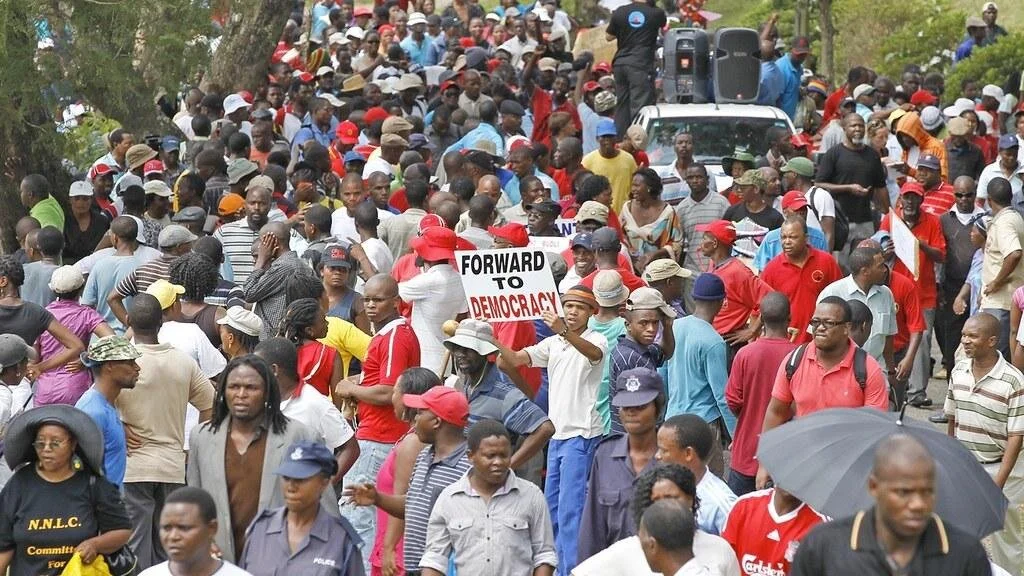For several months deadly political unrest has unfolded in the Kingdom of eSwatini, formerly known as Swaziland. The name change was unilaterally decided in 2018 by King Mswati III, the feudal monarch – in power since 1986 – who is the last of his kind in Africa. Mswati is a living relic of the past but also serves as a reminder that repression manifests today in multiple forms.
Interestingly, the kingdom’s constitution has never been amended for the name change. It was merely announced by the king and later enforced by authorities. The name change was also bravely challenged in court as unconstitutional by one of the few human rights lawyers left in the country – an activist who has himself been routinely targeted and persecuted by royal authorities, and unjustly jailed in solitary confinement for extended periods of time.
The actions of Mswati and those carried out in his name during these episodes demonstrate all one needs to know about this landlocked kingdom, tucked not-so-quietly away in the mountains between South Africa and Mozambique: Mswati rules by fiat and the penalties of dissent and criticism in his kingdom can be severe, brutal, and oftentimes deadly.
Most recently on October 13 a protester was shot to death by Mswati’s security forces, the latest casualty in months of demonstrations that have left at least 80 people dead; local activists and human rights groups, however, claim that the figures are higher and perhaps closer to 100. To be sure, eSwatini has had bouts of unrest over the past decade – including mass pro-democracy protests in 2011 – but the 2021 version unfolding today is different in some measurably key ways. And it might in fact represent a point of no return for the kingdom.
First, the ongoing demonstrations are unprecedented in terms of the widespread depth of popular resentment against the monarchy. The sweeping sense of dissatisfaction has both mobilized and energized eSwatini’s vast – and normally conservative – rural population. What is more, the kingdom’s majority youth population, many of whom are unemployed, has been at the forefront of the coalescing movement. Over the past month students at the university, high school and even grade school levels have been organizing walkouts and calling for a transition to democratic governance. And just this week, a seven-year-old was among the scores of students arrested and shot at by the police during peaceful demonstrations.
Second, the growing grassroots movement seems to have been fueled by the same sort of repression that has typically crushed previous momentum towards reform. The rising sense of ‘enough is enough,’ for instance, was in part sparked by the arrest and jailing on terrorism charges of two pro-democracy MPs, Mthandeni Dube and Mduduzi Mabuza, who last week had their bail applications denied by a top judge (one appointed by Mswati). Their “crime,” by the way was planning to present a resolution to parliament to amend the constitution to allow the people to have a say in the election of their prime minister (also appointed by Mswati). This sentiment – embodied by the mistreatment of the two MPs – also stems from a longstanding culture of impunity within the monarchy, as well as the killing of citizens by the police that has continued this week with brazen impunity.
Third, the popular anger has been powered by more than a lack of democracy and accountable governance. The gradual deterioration of eSwatini’s economic situation due to COVID-19 has also contributed. The continued land grabs by members of the royal family also means that it is now widely seen to be predatory, brazenly corrupt, and simply out of touch with the needs of ordinary Swazis, a majority of whom live below the poverty line. Many Swazi subjects now believe that Mswati has become an absent monarch, hiding away in his palaces while ordering the killing of people on the ground. There is a growing sense of alarm that he would indeed prefer to go down with the country, instead of embracing an opportunity for genuine dialogue.
Taken together, these factors have combined to create a more tenuous situation than the kingdom has ever faced. Many of those risking their lives today on the frontlines of the pro-democracy movement have told me that they are “determined to be the last generation to suffer under the yoke of a dictator king.” That Swazi officials have continued to resist – and even forcefully block – regional efforts to consult with leaders outside of the monarchy has exacerbated an already untenable situation. The kingdom’s intransigence, its deliberate sidelining of popular pro-democracy groups and leaders, and its first resort to deadly violence all risk generating extremism and a potentially unstoppable tailspin.
In the last round of public opinion surveys, conducted in 2018, only 5% of respondents in eSwatini reported that they were happy with the way that “democracy works” in the country. When asked about the best political system to govern the country, the most popular answer by a wide margin was: “Democracy is preferable to any other kind of government.” These findings – and the patently obvious sentiment on the ground – demonstrate that the movement for democratic reform represents the values and beliefs of a strong majority of the Swazi people.
The biggest threat to a peaceful and democratic solution to the crisis in eSwatini is the refusal of King Mswati to countenance political reform and to engage in comprehensive dialogue.
It is time to stand with the Swazi people, not a self-obsessed monarch who clearly has no intentions of reforming himself, nor his increasingly out-of-touch family, away from the throne.
Jeffrey Smith is the Founding Director of Vanguard Africa and the Vanguard Africa Foundation. You can follow him on Twitter at @Smith_JeffreyT.

